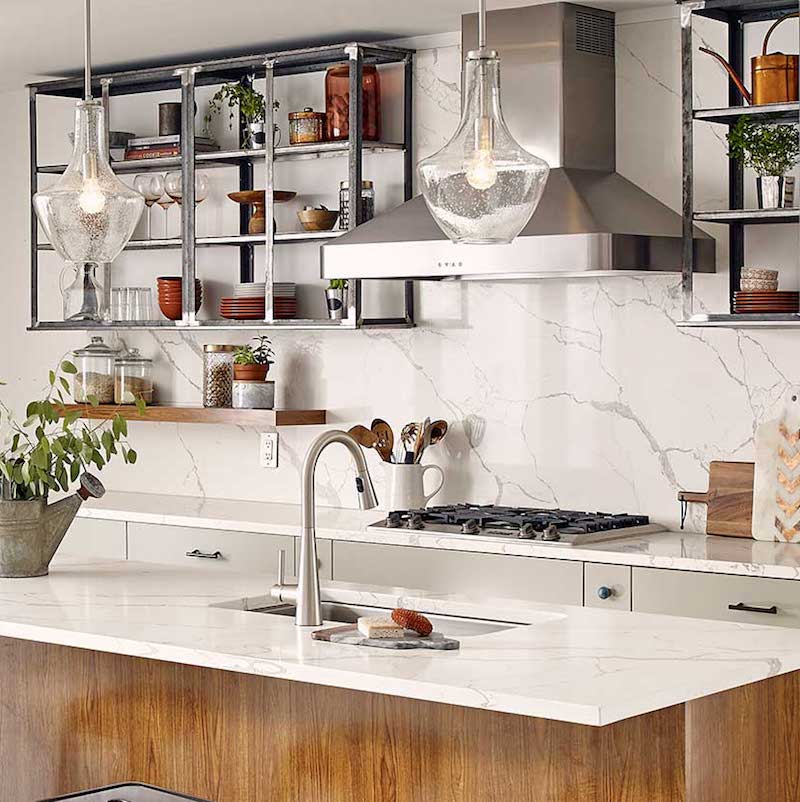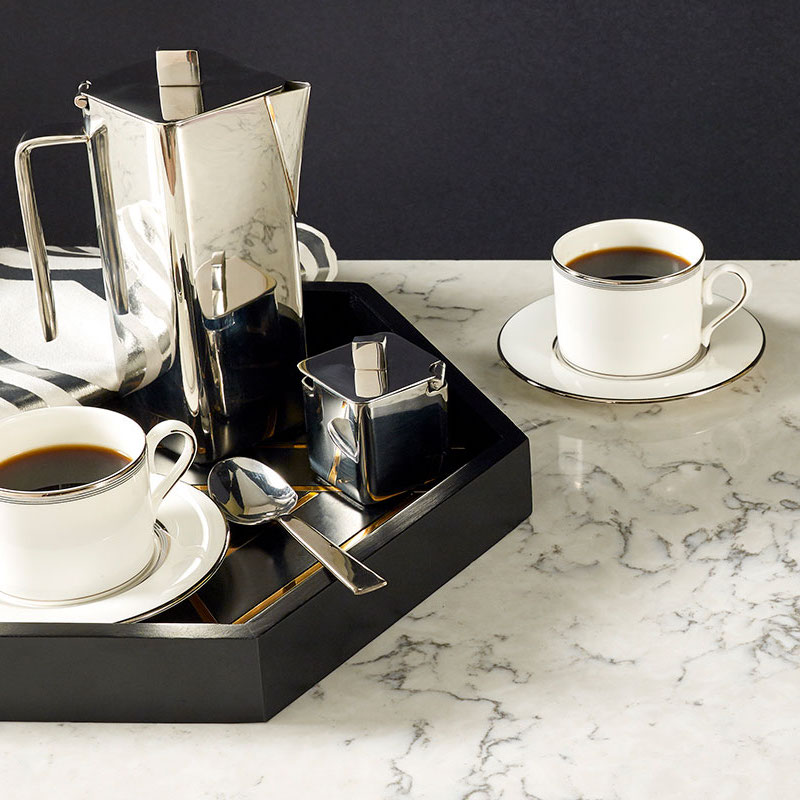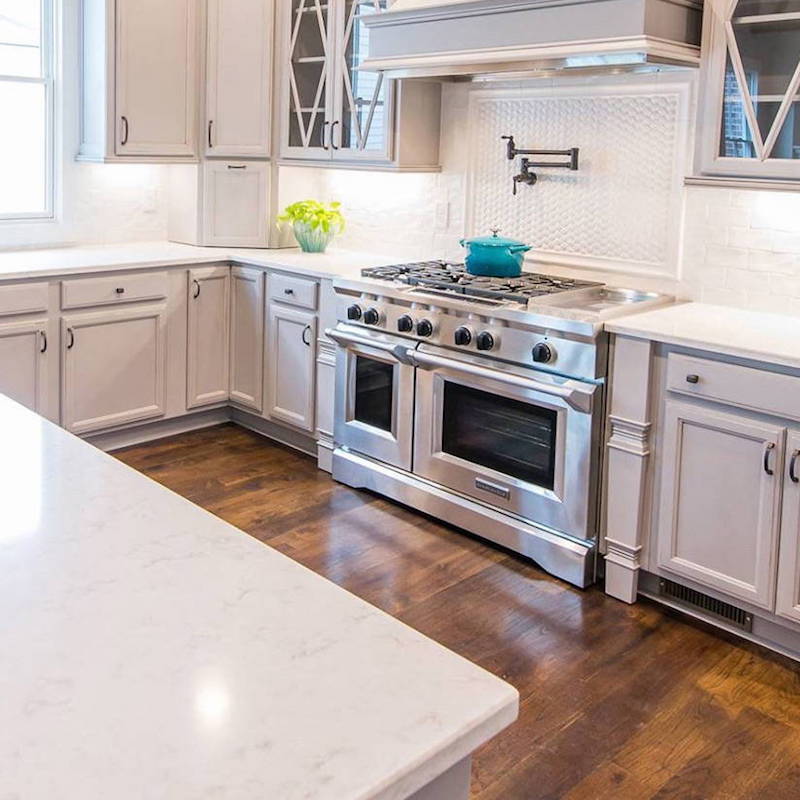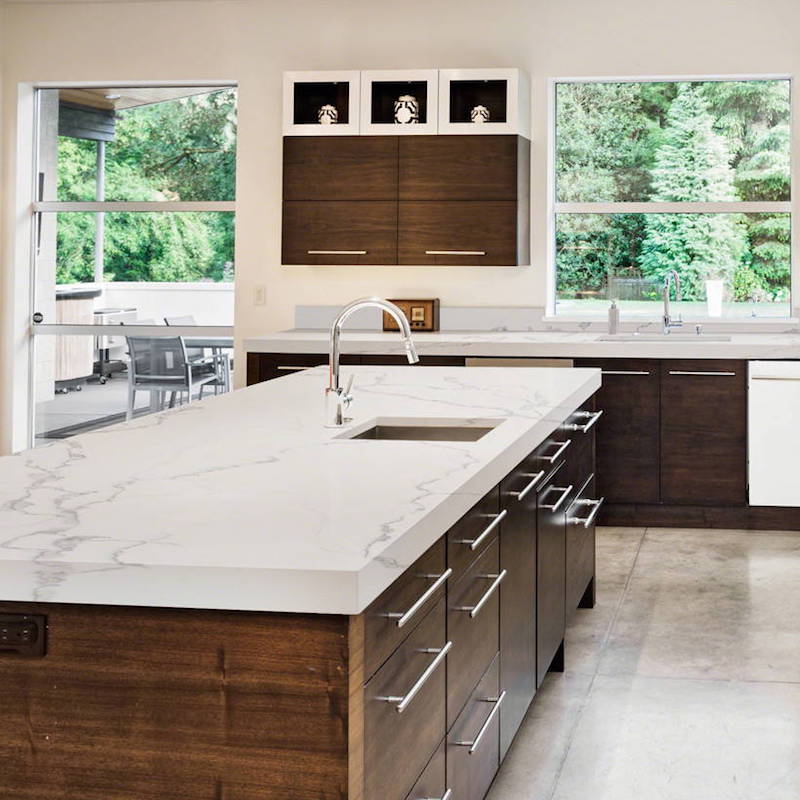Tile Style: Believe It Or Not, These Marble Countertops Are Actually Quartz
March 21, 2018
Who doesn’t love the look of marble, nature’s most elegant stone, with its mix of creamy hues with unique veins? That said, who really wants to fuss with marble! After all, this high-maintenance diva can be a challenge to keep looking its best.
Quartz, on the other hand, gives you the high-end marble look—veins and all—but minimizes the maintenance. It’s a premium surface for countertops, backsplashes and accent walls, yet it’s far more durable than marble.
That’s because quartz mixes real stone with resins that, under high heat and pressure, produce a material that’s both beautiful and tough. In other words, quartz countertops can bring to life your modern marble kitchen ideas, and without sacrificing durability.
Now that we’ve got your attention, allow us to present you with some fast facts. Once you’re armed with the details, you’ll be ready to decide for yourself just how quartz measures up to natural marble.
Marble Cost vs. Quartz Cost
When it comes down to it, this aspect is basically a tie. Marble costs $57-76 per square foot, while quartz goes for $55-75 per square foot.
Much of the price fluctuation is related to installation. Installing large expanses of marble, which requires many seams and hours spent matching up pieces, can take a lot longer than seaming together consistent, manufactured pieces of quartz. On the other hand, quartz is heavier than marble, perhaps requiring more lifting power and structural reinforcements.
In other words, cost is not likely to be the deciding factor that tips you toward either marble countertops or quartz countertops.
Quartz Color is Consistent in Appearance
 Featured: Blanca Arabescato Quartz
Featured: Blanca Arabescato Quartz
Here’s where quartz is the clear winner. What you see on a quartz color sample is what you will get when workers show up to install the actual slab in your kitchen or bath.
Did you know there's
quartz that looks like marble?
Marble, however, is a mined material. Nature abhors consistency, which is why no two snowflakes are alike. The same holds true for a stone that forms in the ground under varying temperatures and pressure. And even though slabs pulled from the same quarry may look similar, they will not be exactly the same. It’s important to keep in mind that the marble sample you loved in the showroom could end up looking quite different from the piece that will become your marble countertop.
This isn't a bad thing. In fact, many homeowners are drawn to the unique swirls and colors that each slab of natural marble provides. It really all depends on your personality and preference here.
Durability of Marble vs. Quartz
 Featured: Cashmere Carrara Quartz
Featured: Cashmere Carrara Quartz
Marble is stone, which makes it a more durable countertop than, for example, wood or laminates. Still, natural marble is a relatively soft and porous stone. That means that it can absorb liquids such as grease and wine spills, and this can potentially stain your gorgeous counters if they aren’t properly sealed and maintained. In addition, hot pots can scorch marble, and a careless swipe with a wine bottle could chip marble countertops.
In contrast, quartz countertops are the toughest of customers. Quartz stands up to stains, heat and chipping. If you’re a messy cook or have an active, busy family, quartz countertops will take the beating that everyday life delivers.
Marble Maintenance vs. Quartz Maintenance
 Featured: Statuary Classique Quartz
Featured: Statuary Classique Quartz
As far as daily maintenance, both marble and quartz are relatively easy to keep. In most cases, a quick swipe of a microfiber cloth and a little soapy water will keep both looking great.
However, marble does require annual sealing to prevent it from staining. Sealing isn’t all that difficult—you just wipe the sealant on with a cloth—but chemical sealants are smelly and take hours to dry. You’ll have to throw open the windows and find something else to do until your sealant dries. That extra yearly maintenance is a deal-breaker for some homeowners.
Quartz, however, requires no sealing whatsoever, even when you first install it. So, your kitchen and bath quartz counters won’t be out of commission once a year.
When you start looking more closely at the characteristics of these two competitors, you may find yourself leaning strongly in one direction or another, and that’s a great start! Either one is a great choice that will give you many years of stylish living…the decision really comes down to your lifestyle and needs.
So, if you’re ready to hone in on your specific style, try MSI’s Find Your Kitchen Countertop Soulmate quiz and see how we do!
More About Quartz Countertops
Seize the Gray! A Guide to Our Most Popular Gray Quartz Countertops
Can Quartz Countertops Be Used Outdoors?
How Do You Estimate the Cost of a Quartz Countertop?
Tips from The Trade: Quartz vs. Granite for Countertops
